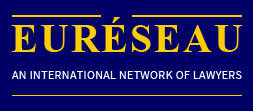
Euréseau Meeting London May 2013
Ambrose Appelbe, London - Hosting Law Firm
Felix Appelbe
Lisa Bolgar-Smith
Lucie Sleeman
James Freemantle
Terrence Trainor
Natalie Lister
Elin Hopley
Leesa Glenwright
Jonathan Rothwell
Richard Inston
are partners and representatives of Ambrose Appelbe.
Our London hosts have organized the most exciting and prominent venue for our successful Euréseau Meeting in London in May 2013.
Our host Felix Appelbe has introduced Middle Temple to us: The Middle Temple and the other three Inns of Court were established by the middle of the 14th century. The Inn’s name derives from the Knights Temple who had been in procession of the tempo side for over 150 years prior to that. Felix refers to the history and emphasizes that in the rooms of today’s meeting venue the Knights have been discussing the basic principles of law if not to say the most wonderful legal system of the world. The earliest principles of constitutional law have been discussed here in these rooms.
The earliest surviving records of the qualifications required of those who would follow the profession of Advocate, date from the late 13th century. In 1275 the Speculum Juris was published; this set out the qualifications required. The City's Liber Custumarum of 1280 contains the standards and rules of the profession, which was already divided into attorneys (presently solicitors) and countors (or apprentices at law, the title barrister being of later date and reflecting strictly the man's status in his Inn). An attorney had to be admitted by the Mayor before practising in the City. A countor was forbidden to act as an attorney.
In 1292, King Edward I charged his Judges of the Common Bench (Common Pleas) with choosing the “best lawyers from the counties, so that the King's court and the people of the Kingdom should be better served and those selected should follow his court and be present therein, and no others”.
The heading to this provision is De attornatis et apprenticiis: both branches thus came under the control of the Judges. The apprentices were usually described as the ‘Apprentices of the Common Bench’ or ‘of the Bench’. The Serjeants, or servientes ad legem, were of older institution and enjoyed rights of audience in the King's Courts, but there would have been a need to supplement that small group with other lawyers of recognised qualifications. It has always been accepted that the right of the four Inns of Court to call appropriately qualified students to the Bar is one delegated to them by the Judges.
During the further course of the Euréseau London Meeting 2013 the new president of the Network Hans-Oluf Meyer has been unanimously elected as the new president of Eurèseau by all the members attending to this meeting.









